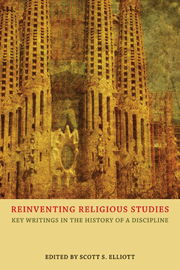Book contents
- Frontmatter
- Contents
- Introduction
- 1 For such a time as this: the Council of Societies for the Study of Religion, 1969–2009
- Part I Inventing and reinventing the field of religious studies
- Part II Method and theory in religious studies
- Part III Teaching religion
- Part IV Women and the bible in religious studies
- Part V Religion and religious studies in civic life
- 24 Contemporary socio-political change and the work of religious studies
- 25 The scholar of religion as a cultural critic: perspectives from Denmark
- 26 What are the humanities and why do they matter? The case of religion and public life
- 27 Response to Gary Lease's “What are the humanities, and why do they matter?”
- 28 So, what are we professing here? Religion, the liberal arts, and civic life
- 29 Response to Raymond B. Williams's “So, what are we professing here? Religion, the liberal arts, and civic life”
- 30 Response to Raymond B. Williams's “So, what are we professing here? Religion, the liberal arts, and civic life”
- 31 Response to Raymond B. Williams's “So, what are we professing here? Religion, the liberal arts, and civic life”
- 32 Rejoinder
- Part VI Religious studies and identity politics
- Part VII Islam and 9/11
- Bibliography
- Acknowledgments
- Index
29 - Response to Raymond B. Williams's “So, what are we professing here? Religion, the liberal arts, and civic life”
from Part V - Religion and religious studies in civic life
- Frontmatter
- Contents
- Introduction
- 1 For such a time as this: the Council of Societies for the Study of Religion, 1969–2009
- Part I Inventing and reinventing the field of religious studies
- Part II Method and theory in religious studies
- Part III Teaching religion
- Part IV Women and the bible in religious studies
- Part V Religion and religious studies in civic life
- 24 Contemporary socio-political change and the work of religious studies
- 25 The scholar of religion as a cultural critic: perspectives from Denmark
- 26 What are the humanities and why do they matter? The case of religion and public life
- 27 Response to Gary Lease's “What are the humanities, and why do they matter?”
- 28 So, what are we professing here? Religion, the liberal arts, and civic life
- 29 Response to Raymond B. Williams's “So, what are we professing here? Religion, the liberal arts, and civic life”
- 30 Response to Raymond B. Williams's “So, what are we professing here? Religion, the liberal arts, and civic life”
- 31 Response to Raymond B. Williams's “So, what are we professing here? Religion, the liberal arts, and civic life”
- 32 Rejoinder
- Part VI Religious studies and identity politics
- Part VII Islam and 9/11
- Bibliography
- Acknowledgments
- Index
Summary
There are two aspects of Williams's lecture that I find both viable and admirable. First, Williams attempts to justify philosophically the existence of a secular exceptionalism for religion departments and scholars of religion. He does so by proposing a model of “civic religion” for the study of religion, a model that would create a community of religion scholars within our department based on a sense of civic duty to one another and our subject matter. We then, in all likelihood, could extend these civic duties to the larger local university and city communities, fulfilling our roles of scholars and teachers by making contributions to their stability and growth as well.
Second, Williams implicitly asks the question “What is your department of religion as a historical project?” and answers it by trying to locate our history in a coherent shared knowledge base, a “canon,” presumably one that we scholars have freely chosen to come to a consensus upon, one that can act as the “thread” of tradition to bind our past to our future. Basically, within our department we have built and continue to sustain our own unique intellectual culture that can and does condition future possibilities. Establishing a department on such a basis would be the starting point for expanding the future of our department by enabling it to absorb both academic discords and the perplexing worlds of religions, transforming itself in the process.
- Type
- Chapter
- Information
- Reinventing Religious StudiesKey Writings in the History of a Discipline, pp. 191 - 192Publisher: Acumen PublishingPrint publication year: 2013



